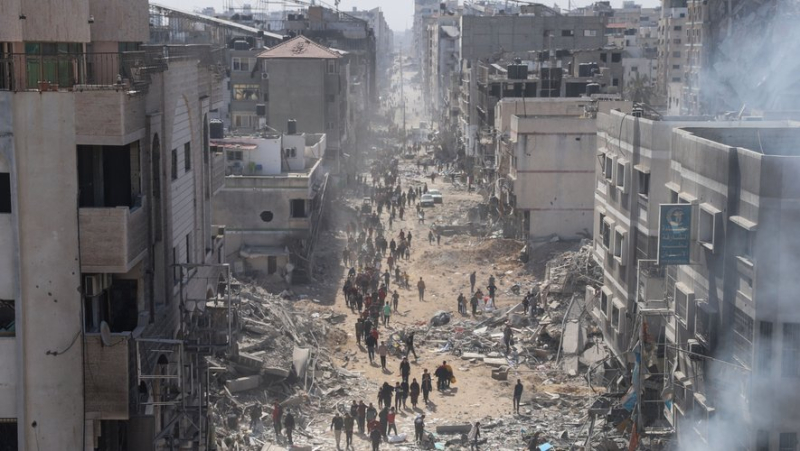War between Israel and Hamas: six months after the attacks of October 7, “an impasse, there is no exit door visible today”

A Gaza, la 1er avril, après la destruction de l'hôpital Al-Shifa. XinHua – Mohammed Ali
What perspectives six months after the attacks of October 7 ? Analysis with Bertrand Badie, professor emeritus at Sciences Po Paris, author in particular of the book "For a subjective approach to international relations" (Odile-Jacob), considered one of the most influential specialists in international relations.
How do you analyze the situation in the Middle East, six months after the terrorist attacks of October 7 and the start of the Israeli response?
The essential lesson that we can draw from this, for the moment, is the ineffectiveness of the strategy of power against violence. But the Netanyahu government has no plan B and neither does the Israeli political class. The operation carried out by Israel following the attacks of October 7 consisted of eradicating Hamas, six months later, this seems more uncertain than ever. Worst of paradoxes, Hamas has not never been so present in the international agenda and it maintains its popularity within the popular gazaoui.
These six months were, moreover, extremely deadly. It is also worrying for the future because the victims of today will inspire rages of tomorrow which risk being even stronger than the violence that existed today. we knew on October 7.
The last lesson is the lack of coherence of the international community. We have never seen the United States so hesitant between a rhetoric criticizing Israel’s behavior like never before and a practice which is that of delivering weapons to the US’ rsquo;Hebrew State.
And also isolated: the United States abstained in the UN Security Council vote, this is new, but the other members voted ;the ceasefire resolution. That the world's super power finds itself alone in a vote, separated from its allies, is a major fact of world diplomacy.
That American Secretary of State Antony Blinken visits the Middle East six times, Joe Biden once, to which are added multiple contacts, and that the United States cannot in any way influence the position of’ rsquo;Israel is also a surprise.
The northern powers, like the EU, like most southern states, have had fluctuating, hesitant attitudes.
On the Israeli-Palestinian issue we have long witnessed the diplomacy of indifference, today we are witnessing the trivialization of a diplomacy of embarrassment and hesitation. All this bodes ill for the future.
The only actor that can put an end to this spiral of violence in Gaza is Washington if it decides to stop arms deliveries to Israel. But the United States hold the Hebrew State for the advanced point of the West in the Middle East and this would amount, in particular, for them to win the camp of the ;rsquo;radical Islamism, embodied by Hamas.
The possible election of Donald Trump could also have an impact…
He is an unconditional supporter not only of the State of Israel but of Benyamin Netanyahu, to whom he is extremely close, a support on which the Israeli Prime Minister relies.
But his election would not completely erase the American-Israeli dispute which continues to grow, if only because American society is transforming, a good part of young people are now closer to the cause Palestinian with whom she identifies. There is no longer this social support of the American people for Israel.
Netanyahu is facing, at the same time, growing protests in his country.
Undeniably, this pressure is acquiring an intensity unprecedented since the creation of the State of Israel in 1948. This being said, there are logics in this contestation that are far from embracing all the contours of the Israeli-Palestinian conflict, in particular a feeling of exasperation with regard to Netanyahu deemed responsible for the security failures of October 7 and also incompetent or manipulative in the management of this war which he would wage to delay or prevent his indictment before the Israeli courts.
but nothing in the current mobilization in Israel announces a real change of attitude towards the Palestinian question, the two-state solution is not progressing. Another government would have a stronger popular base, but would be far from promoting a real peace solution.

Bertrand Badie, author of the book “For a subjective approach to international relations” (Odile-Jacob). DR
What forces are involved today in this conflict, can we fear an extension?
This conflict is not just a head to head between Israel and Hamas, it has sprawling dimensions that spare no one in the region, first and foremost Lebanon, through Hezbollah, but also Iran, Yemen, Syria and all the Arab governments which are taken as witness by their public opinion But neither the’ rsquo;Iran, neither Syria nor Lebanon have any real interest in entering into a war whose costs and uncertainties appear far too high.
We therefore risk being in this zone of uncertainty for a long time halfway between peace and war, but we must closely monitor Arab public opinion and the evolution of the actors deployed. in this conflict, first and foremost Hezbollah.
Can we fear an escalation after the Israeli raid on the Iranian consulate in Syria ?
Bombarding an embassy is attacking the country directly, Tehran is therefore obliged to react, but it has not no interest in this conflict degenerating into an Iranian-Israeli war, she would have too much to lose so I think there will be a controlled response. But the risk is the blunder, the gesture which goes beyond the initial intentions and can lead to an endless escalation. We are therefore in a very dangerous situation.
Beyond that, this war has repercussions across the world; we have observed in particular a rise in anti-Semitism in France.
It also results in acts of Islamophobia. This is globalization. A conflict that takes place somewhere creates identification mechanisms, which leads to the dissemination of violent and aggressive acts.
Alas, this phenomenon risks becoming commonplace, if a solution is not found, this should lead the international community to take strong initiatives to put an end to this conflict and in particular to match the ceasefire request with sanctions.
The conflict also had an economic impact.
There is a systemic logic, a conflict in the Middle East has an impact on world oil policy, on commercial circulation in the Red Sea with the attacks of the Houthis, on the morale of economic operators, therefore if this conflict is widening and strengthening, and we must expect that the world economy will suffer from it as it had to suffer from the Russo-Ukrainian war.
What are the perspectives in this conflict ?
He's in a double bind. Impasse in this stubbornness of considering that power is the only one capable of overcoming a dispute, and impasse because the posture chosen by the international community, that of the ostrich, is the most ineffective which either, and the United Nations is unable to propose an alternative solution. It is with the Israeli-Palestinian conflict, as with the Russian-Ukrainian conflict, there is no visible way out today.
I subscribe to read more




